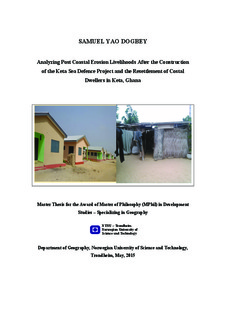Analyzing post coastal erosion livelihoods after the construction of the Keta Sea Defence Project and the resettlement of costal dwellers in Keta, Ghana
Master thesis
Permanent lenke
http://hdl.handle.net/11250/2373230Utgivelsesdato
2015Metadata
Vis full innførselSamlinger
- Institutt for geografi [1097]
Sammendrag
Over the years, coastal erosion has posed a serious threat to many coastal dwellers. Coastal erosion has destroyed the livelihood and properties to affected communities which led them to impoverishment. The effect is largely felt by the developing countries since a larger number of people in these regions depend directly on the sea for their livelihoods. To address this menace, coastal defence projects and resettlement of the affected people were the approaches adopted by many governments. The thesis the current assets of the people of Keta, their livelihood strategies and how they organized their livelihoods after the construction of the Keta Sea Defence and the resettlement project. Specifically, the thesis address the governance and institutional mechanisms that affect the resettlement process and how people’s livelihoods are organized, The contributions of the resettlement process in in strengthening or weakening the local capabilities and access to livelihood asset and the livelihood strategies adopted by the affected people to achieve their livelihood outcome.
Findings from the research show that the resettlement process has been influenced by various actors which affect people’s livelihood in the affected community. The quantity of the houses built is not up to the number promised, as a result many people could not get the houses. The problem of who deserve to be given the house was a major issue and the residents believe some of the people living in some of the houses were not from the community. The quality of the house did not live to expectation due to insufficient supervision during the construction stage.
Despite the fact that people express some level of satisfaction about the assets they have in the new area, they also indicate that the improvement in those assets did not lead to satisfactory livelihood outcomes. They express satisfaction about the road network, education and health provision in the community which was not the case before the resettlement.
Due to challenges posed by the erosion, many people could not continue the livelihood they had before the project. They adopted other strategies in order to gain a
living. Reduction in fish catch and inaccessibility of the seashore has forced some fishermen to migrate seasonally to other fishing areas outside the community or to neighbouring countries to fish. Remittances sent by those who travelled to other areas help in the upkeep of the families.
Based on the findings, I recommend construction of more houses to accommodate those who are still homeless as a result of the erosion. Secondly, the government must develop the salt industry in Keta to create job for the community and also establish fishing harbour as promised in the Keta Sea Defence Project. Also, the Keta lagoon has a great potential for tourism development and if harnessed can create job for the unemployed in the community.
